In data scraping, automation, and geo-targeted marketing, the choice of proxy provider can make or break your operations. Two popular rotating residential proxy providers are LunaProxy and PyProxy — both offering powerful solutions for businesses and developers.
In this in-depth comparison, we’ll break down their features, performance, pricing models, IP coverage, and use cases — with real-world insights from the proxy industry. Offer a reference for your decision.
An Overview of LunaProxy and PyProxy
LunaProxy Overview
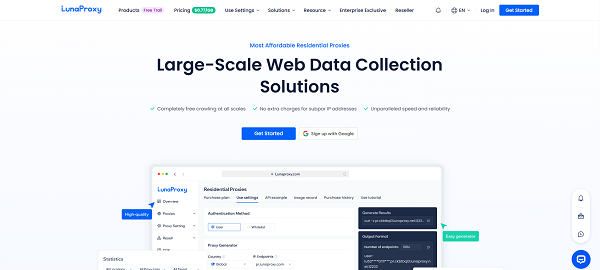
LunaProxy is a proxy provider specializing in residential and static proxies, known for its affordability, wide IP coverage, and user-friendly dashboard. Its main target application is scraping.
PyProxy Overview
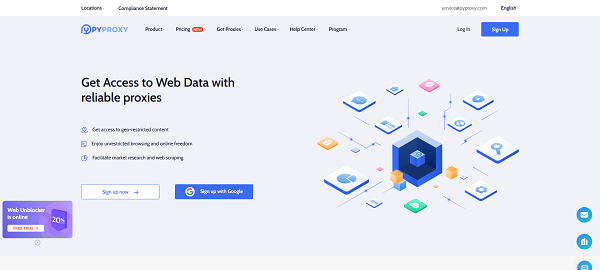
PyProxy is an emerging proxy platform offering a diverse range of proxies, including residential, datacenter, and ISP proxies. It’s aimed toward large-scale data collection and network capture.
Comparison Overview
| Feature / Provider |
LunaProxy |
PyProxy |
| Proxy Types |
Primarily residential proxies, Datacenter |
Residential, Datacenter |
| IP Pool Size |
200M+ IPs in 195+ countries |
90M+ IPs in 190+ countries |
| IP Rotation |
Automatic, customizable (per request or timed) |
Frequent, less customizable |
| Speed & Stability |
High speed, stable for long-term use |
Fast, some reports of peak-time lags |
| Session Control |
Rotating & sticky sessions |
Rotating & sticky sessions |
| API & Integration |
Robust, good documentation, automation-friendly |
Comprehensive, slightly less intuitive docs |
| Pricing |
Flexible plans, better value for large-scale users |
Flexible plans, more affordable for smaller-scale needs |
| Geo-Targeting Options |
Country, city, and ISP-level targeting |
Country, city, and ISP-level targeting |
| Ideal For |
Web scraping, SEO, e-commerce, global data |
Data mining, market research, high-volume tasks |
| Free Trial / Demo |
Paid trial available |
Paid trial available |
| Customer Support |
Live chat + Email+WhatsApp |
Email + Telegram |
| Scalability |
Highly scalable, suitable for enterprises |
Scalable, better for small to mid-sized needs |
1. Proxy Types & IP Pool
LunaProxy:
Offers primarily residential and static proxies with high anonymity.
Massive IP pool: Over 200 million IPs across 195+ countries.
Includes datacenter proxies.
Ideal for bypassing geo-restrictions and CAPTCHAs.
PyProxy:
Provides both residential and datacenter proxies.
Residential pool: Over 90 million IPs globally.
Emphasizes performance and API-driven access.
Supports SOCKS5 and static ISP proxies.
Edge: LunaProxy wins on sheer IP volume, global, and ISPs coverage, making it ideal for large-scale scraping or regional ad testing.
2. Performance & Stability
LunaProxy:
Claims 99.9% uptime.
Download speeds average 18.9 Mbps in independent tests.
Automatic IP rotation ensures fewer blocks.
Slight latency during peak hours reported by some users.
PyProxy:
Also boasts 99.9% uptime.
Strong performance during high-volume tasks.
Self-built IP pool enhances stability.
Slightly more consistent under heavy loads.
Edge: PyProxy may have a slight edge in connection stability, but LunaProxy delivers better speed under normal conditions.
3. Pricing & Value(March 31, 2025)
LunaProxy:
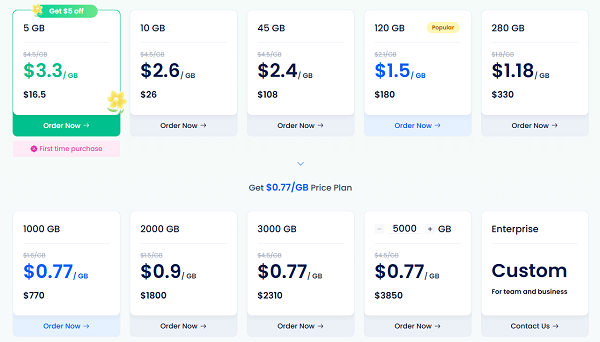
Starts at $0.77/GB for residential proxies (pay-as-you-go).
Offers unlimited plans from $79.2/day.
Static ISP proxies from $3/IP one week.
Tiered pricing aimed at mid-to-large businesses.
PyProxy:
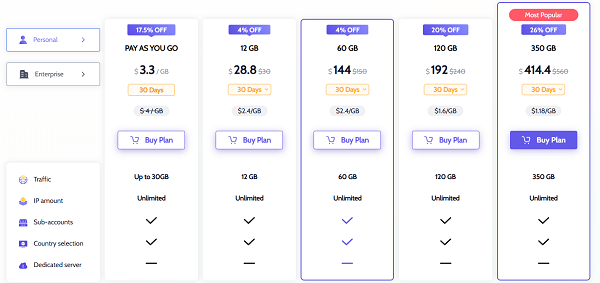
Also starts at $0.77/GB for residential proxies.
Flexible plans based on traffic or IP count.
Also static ISP proxies from $3/IP one week.
Great for developers or startups needing scalability.
Edge: Though their start price is the same, LunaProxy is more affordable per GB for the same discount for enterprise-level needs. While PyProxy is cheaper for personal-level needs.
4. API Integration & Developer Tools
LunaProxy:
Idea for API integration and developer tools.
Extensive documentation and advanced features
Easy setup with rotating or sticky sessions.
PyProxy:
less feature-rich but still reliable for smaller to mid-sized projects.
Supports automation tools and SDKs.
More manual customization options for advanced users.
Edge: PyProxy is more developer-centric with greater control over session behavior and integration capabilities.
5. Anti-Ban & Stealth Features
LunaProxy:
Large IP pool enhances stealth.
Auto IP rotation minimizes detection.
Effective at bypassing CAPTCHAs and regional blocks.
PyProxy:
100% real residential IPs with session persistence.
Strong anti-block rotation system.
May require some manual setup for advanced stealth.
Edge: LunaProxy has an advantage here due to its larger pool and plug-and-play stealth features.
6. Use Case Suitability
Choose LunaProxy for Web Scraping at Scale, SEO Tracking & SERP Monitoring, Ad Verification (Global)
Choose PyProxy for Social Media Management, Mobile App Testing, Automation Bots / Scripting
Both platforms serve different audiences well — marketers may lean toward LunaProxy, while developers might prefer PyProxy flexibility.
7. Customer Support & User Experience
LunaProxy:
Offers live chat, email, and WhatsApp support.
Known for quick response times.
Clean, intuitive dashboard UX.
PyProxy:
Support via email and Telegram.
Active developer community forums.
Functional dashboard, though less polished.
Edge: LunaProxy wins on UX polish; PyProxy excels in community-driven support for developers.
Which One Should You Choose?
Both providers offer excellent services — but cater to slightly different user profiles:
Choose LunaProxy if you need: A massive global IP pool, Faster speeds, Simple setup for marketing or scraping, Bonus bandwidth offers
Choose PyProxy if you want: Lower per GB pricing for personal use, Better control over sessions, Strong API integration, Flexible plans for developers
Still Deciding? Consider GoProxy for a Hybrid Solution
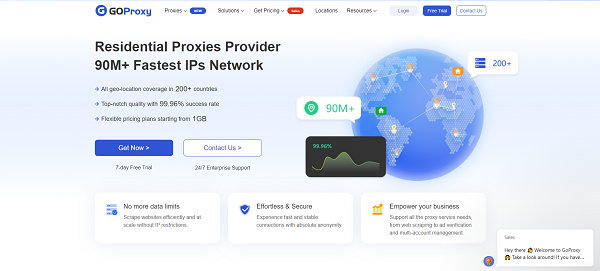
For those who find the trade-offs between LunaProxy and PyProxy.com challenging, GoProxy offers a compelling alternative by combining the best features of both platforms:
- Global IP Coverage: Access millions of residential IPs across 200+ countries and regions, and mobile proxies are also provided. Unlimited presidential proxies from only $72.5/Day.
- High-Speed & Stable Connections: Benefit from low-latency, high-uptime proxy networks built for scale. Less than 0.6s Response Time.
- Flexible Session Management: Switch seamlessly between rotating and sticky sessions.
- Competitive Pricing Plans: Choose from a range of plans suitable for solo developers and large enterprises alike.
- Robust API & Dashboard: Gain full control with real-time analytics and automation-ready endpoints.
- Responsive Support: Enjoy 24/7 expert assistance tailored to your business needs.
GoProxy is designed to deliver performance, reliability, and control, ideal for those who want to experience the best of both worlds.
Final Thoughts
The choice between LunaProxy vs PyProxy ultimately depends on your specific requirements—whether speed, IP volume, pricing flexibility, or API integration is most important to your operations. Both providers have their distinct strengths, and your decision should align with your use case and technical needs. For many, the solution might even lie in exploring alternatives like GoProxy, which strive to offer a balanced approach.

















